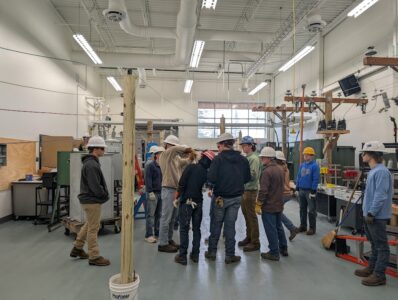Local officials discuss financial impact of ice storm, relief efforts

Courtesy Photo People stand in line waiting for a hot meal while at the temporary warming shelter at the Alpena Township office building on March 31. Other people who were also out of power at home huddled to stay warm and charge their mobile devices. The shelter is no longer needed, but the cost of it being open may have an impact on the township’s budget.
ALPENA — For local governments that often run on tight budgets, the expenses they have incurred from the historic ice storm could take a toll on municipal finances.
The storm, which left tens of thousands of people without power, heat, and running water, hit Northeast Michigan starting on March 28, and some people are still without power today.
As the devastation from the storm became clear, local governments quickly opened warming shelters, ran generators to keep critical services operational, and are now leading cleanup efforts for the debris that impacted almost everyone’s property to some degree.
All of those efforts came with a price tag and local officials are just beginning to scratch the surface on what the final bill could be, while hoping the state and federal government can reimburse them.
On Friday, Michigan Gov. Gretchen Whitmer officially asked President Donald Trump for help in response to the recent ice storm and urged him to issue a Presidential Emergency Declaration for the State of Michigan, 12 northern counties, and the Little Traverse Bay Bands of Odawa Indians.
If approved by the president, the declaration would authorize up to $5 million in immediate public assistance to support emergency efforts, including debris management needs.
It would not reimburse local governments, however, but there is another action Trump could take to provide financial relief to local governments.
Trump could issue a Presidential Major Disaster Declaration, which is required to access funding for longer-term recovery programs.
To evaluate eligibility for that broader assistance, the State of Michigan will conduct Joint Preliminary Damage Assessments with FEMA and the U.S. Small Business Administration beginning the week of April 20.
These assessments will determine whether the extent of damage meets federal thresholds for a major disaster declaration. Based on the results, the state may request assistance to individual households, which would provide direct help to homeowners and renters, as well as public assistance, which could reimburse local governments and tribal agencies for response costs, debris removal, and repair of damaged infrastructure.
In Alpena, some preliminary figures have been released of what some of the costs are for the city’s response to the weather emergency. City Manager Rachel Smolinski said it cost about $18,000 to keep septic pumps running to limit damage from water backing up in people’s homes. She said emergency first responders, Department of Public Works (DPW), and other staff worked long hours during and after the storm, and the cost of the high amounts of overtime will be large. A concrete total has yet to be reached, but she anticipates the labor number will be substantial.
Smolinski said there is already a large bill racked up for cleanup and that bill is expected to climb, as there is still much work to do. She said as of the end of the day Monday, the city has spent $35,700 alone for labor and equipment for DPW and hired three contractors that will help with clean up in the coming weeks. She said clean-up could extend into May, and the costs will continue to rise the longer the work goes on. Smolinski said the fallout from the storm also sets back the city’s annual work preparing parks and other properties for summer, and overtime will likely be needed to get that work done.
“Our salary lines in our budget will definitely need to be corrected,” she said. “This puts us behind on our normal summer prep work and it’s not like we can just let things we normally do maintenance-wise go.”
Smolinski said the expenses from the storm were obviously not budgeted for in the city’s current budget, so much of the costs will likely have to come from the city’s savings.
Alpena County, which has struggled for years with a large budget shortfall and dwindling savings, will also have a large bill when things return to normal. County Administrator Jesse Osmer said at this point, he does not know how much the storm will cost the county, but it will have a negative impact on finances, and to what degree is still up in the air.
“It definitely cost us something, but we have not done an audit, so the exact cost is still unknown,” Osmer said.
Osmer added that he doesn’t know yet where the money will come from to pay the bills left from the county’s response to the storm. He said the current budget was crafted conservatively and there may be some wiggle room. Taking the money from savings could be tricky, however, as the county’s fund balance is almost to the point where if it falls much more, mandatory layoffs could be made, according to policy.
Like Alpena, Osmer said there is a large backlog of work that needs to be addressed because the offices were closed for a week. He said that will result in overtime being needed to catch up.
The county and Alpena Township ran warming shelters that provided lodging and meals for people while their power was out, and Osmer said the expenses for that could have been much higher, but many people stepped up and volunteered and donated food to feed the people at the shelters.
“I think we would be in much worse shape if it wasn’t for the people who stepped up to help,” Osmer said.
Alpena Township Supervisor Abbi Kaszubowski said the costs of overtime for the water department and fire department will be large, but necessary. She said the cost to run the generators and the costs for the shelters will also add up. Kaszubowski said the cost may not be as high for the township as some other municipalities because the power came back on at the township office building much quicker than for others.
“There was an increase in the amount of EMS runs, and it was all hands on deck to make sure we were protecting our residents, so there will be a lot of overtime,” she said. “We sort of got lucky that we got power back as soon as we did. Some businesses and residents weren’t so lucky.”
Kaszubowski said it is not known where the township will come up with the money to pay for the unplanned expenses, but she said it will be discussed at future board of trustees meetings.
Meanwhile, Northeast Michigan is waiting on the president and for the local assessment to be complete to see what degree of federal support may be available.
Steve Schulwitz can be reached at 989-358-5689 or sschulwitz@TheAlpenaNews.com. Follow him on X @ss_alpenanews.com.





